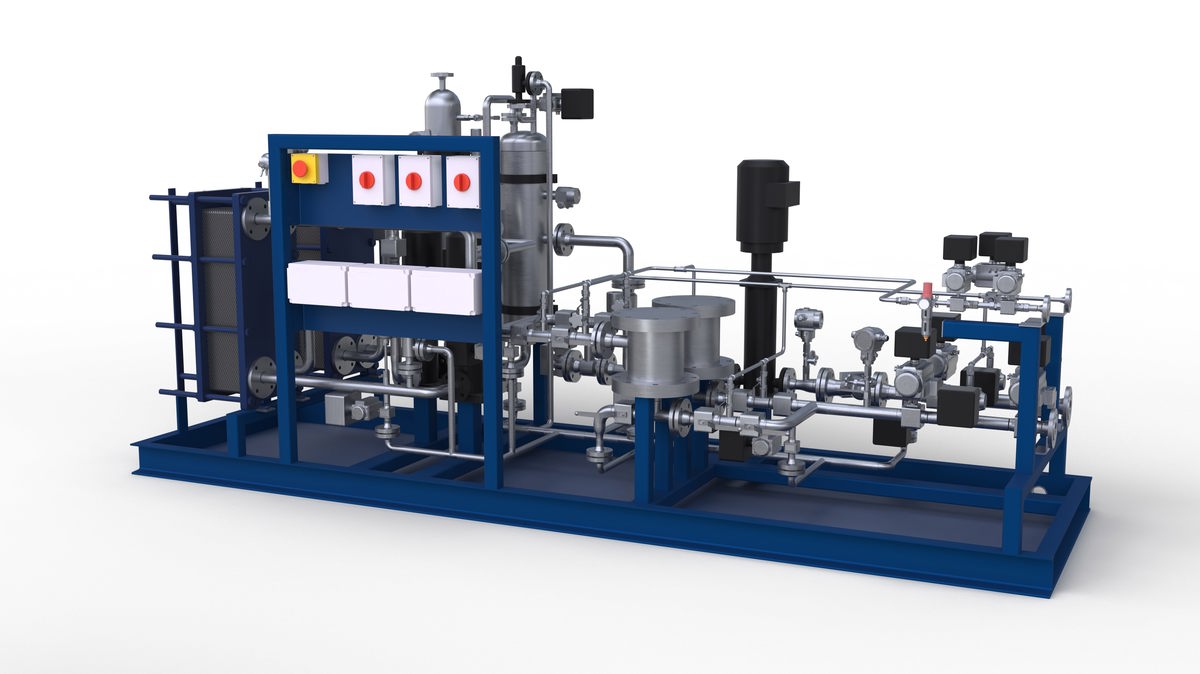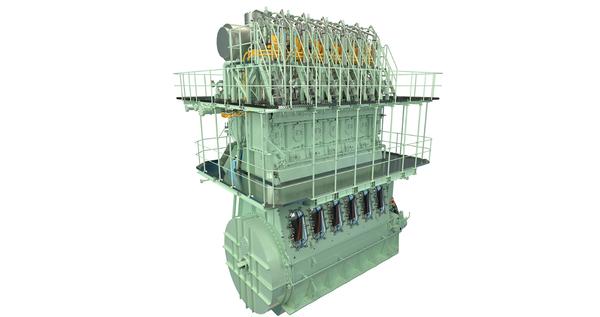Future Fuel Talks: Fuel tank size not a major concern for methanol ships – Auramarine
Methanol fuel storage tanks onboard methanol-capable ships will not drastically impact their cargo capacity and operational efficiency, Auramarine tells ENGINE.
 MODEL: Methanol fuel supply unit. Auramarine
MODEL: Methanol fuel supply unit. Auramarine
A number of shipping companies have invested heavily in methanol-capable ships. There are already 33 methanol-capable ships in operation and another 248 ships on order for delivery towards 2028, according to classification society DNV's database. As methanol's popularity as a bunker fuel grows, DNV suggests that lower energy density could pose a "limiting factor" for its use on ships.
Auramarine project manager Mikko Sinivaara and product manager Valtteri Vainio, do not seem fazed by this concern.
“I don’t believe that the tank capacity is that big of an issue,” Vainio says in an exclusive interview with ENGINE.
Finland-based Auramarine produces fuel supply systems designed to enable ships to use methanol alongside conventional fuels for propulsion. Its fuel supply system is compatible with two- and four-stroke marine engines and can either be installed on newbuilds or retrofitted to existing engines.
The company has "secured a number of orders for its methanol supply system, with increased interest from shipowners, operators, OEMs [original equipment manufacturers] and shipyards across multiple ship segments, including container ships, cruise ships, and tankers," the spokesperson said.
Managing methanol’s lower density
Methanol’s volumetric energy density is around 2.5 times lower than that of conventional marine fuels such as very low sulphur fuel oil (VLSFO) or marine gas oil (MGO), and 1.3 times lower than that of liquefied natural gas (LNG), DNV notes.
This also means that methanol-fuelled ships need to consume 2.5 times more fuel to cover the same distance as VLSFO- and MGO-fuelled ships, and that methanol fuel storage tanks onboard ships need to be 2.5 times bigger than VLSFO and MGO storage tanks. The same logic applies for LNG with a 1.3 multiplier.
Larger fuel tanks will require more space, potentially compromising the ship's cargo capacity and operational efficiency. This raises the question of whether shipowners are ready to sacrifice cargo capacity for methanol fuel storage onboard.
Vainio believes this obstacle has a manageable solution. While methanol requires more storage tank space, these tanks do not all need to be in the same place – they can be spread around the ship,
Alternative storage locations
Methanol can be stored in double bottom tanks, according to Vainio. Double bottom tanks are storage compartments located beneath a ship's cargo holds or main deck, primarily designed for storing liquids. This kind of flexibility is not available with LNG or even conventional fuels, he explains.
“Conventional fuels are not stored to double bottom tanks due to the leak risk in case of grounding. Methanol is biodegradable, and therefore it does not cause any long-lasting environmental consequences. With LNG, you have these pressurised tanks and you need to be careful where they are [placed] on the ship,” Vainio says.
Methanol does not need to be stored in special cryogenic temperatures or compressed conditions like LNG because it is liquid in ambient temperatures. This can ultimately have a greater impact on cargo space, he says.
A Methanol Institute report has noted that methanol can also be stored in existing conventional fuel storage tanks or even in ballast tanks onboard ships. Ballast tanks are compartments within ships designed to add structural support. The tanks are typically located in the lower part of ship hulls and filled with water to adjust weight distribution.
Unlike the Methanol Institute, Vainio does not think it is practical to store methanol in ballast water tanks on ships. It has not been tried yet and case studies are needed to find out whether it will work.
"However, separate methanol tanks in the double bottom can increase the storage capacity significantly,” he says.
Methanol fits all sizes
Another report from the Methanol Institute argues that methanol's lower energy density renders it more fit for “vessels that do not undertake very long or short journeys and tend to sail on fixed, round-trip schedules.”
“This includes cruise ships, inland waterway bulk transport vessels, short-sea container ships, ferries, shortsea tankers, deep-sea container vessels, and general cargo vessels,” the report says.
Vainio agrees that ship size will not affect methanol uptake.
“Methanol’s low [energy] density compared to conventional fuels obviously means that ships burning methanol will need larger [bunker] stems or more frequent refueling. But we don’t see ship sizes limiting it in any way,” Vainio argues, “because I think the big question is where the ship is operating and what products they are selling.”
It can often be more feasible for container shipowners to use green methanol as a fuel since "they can increase the price of their containers, especially if it’s a green container."
The same goes for passenger ships, Vainio adds.
“So, I would say that I would not see the ship sizes limiting that much because we have seen inquiries [from] both really big [shipowners] and also very small ones.”
Catalyst for methanol adoption
Vessels will either require new engines to run on methanol, or extensive modifications to existing engines and fuel supply systems. DNV estimates that retrofitting ships to run on methanol could cost between $5-15 million.
Sinivaara suggests that marine emissions regulations like FuelEU Maritime will help to ease the burden of additional investments and drive methanol uptake on ships.
"Even if the costs of retrofitting ships to run on methanol are high, the environmental benefits outweigh them. This will be okay, at least in EU waters as an example, because there are incentives in the FuelEU Maritime that will promote the use of methanol on ships. So maybe consumers are willing to pay higher prices. It is clear that change is coming, and it is obligatory that something is done about it," he says.
By Konica Bhatt
Please get in touch with comments or additional info to news@engine.online






